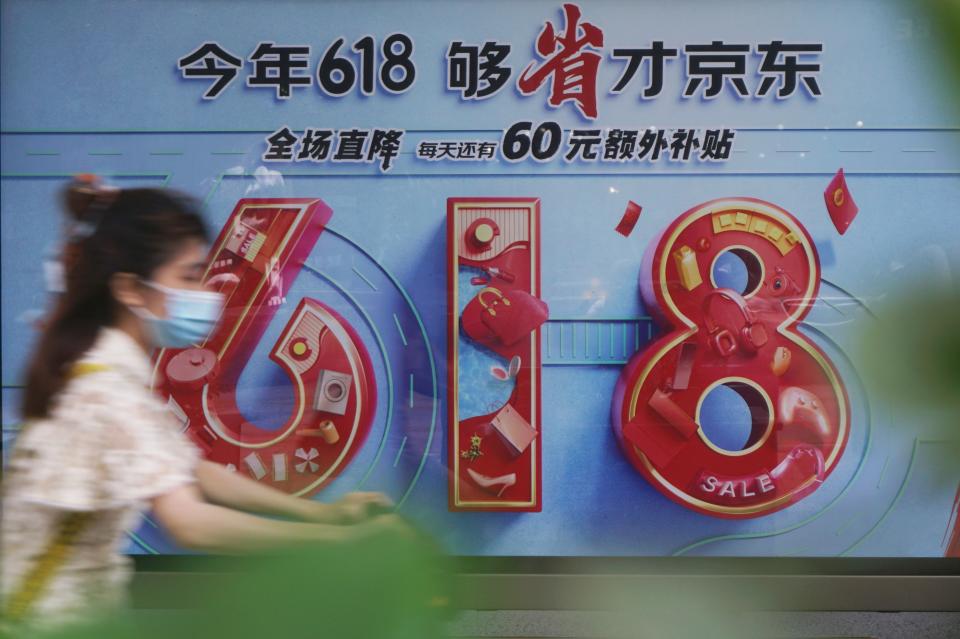Slower Growth During China’s 618 Shopping Festival Signals Lagging Consumer Confidence

SHANGHAI — Based on this year’s 618 online shopping festival results, Chinese consumers are beginning to spend more cautiously, as the post-reopening consumption rebound began to lose steam.
According to Syntun, a third-party data provider, total gross merchandise volume during 618 from major e-commerce platforms such as Tmall, JD.com, Douyin and Pinduoduo reached 614.3 billion renminbi, or $85.8 billion, an increase of 5.4 percent year-over-year but logging the slowest growth rate since 2020.
More from WWD
B.B.C., Chicago's Beauty Retailer Offering Black-owned Brands, Expands to L.A.
PubMatic and Klarna Partner for Programmatic Advertising, Increasing Engagement Rates
LVMH Expands Partnership With Alibaba Group to Deploy AI in China
Alibaba, Tmall’s parent company, chose to focus on empowering small merchants. The company said GMV for over 2.56 million small-to-medium-sized companies topped last year’s 618, with 1.18 million breaking the 10,000 renminbi mark.
JD.com, which celebrated its 20th anniversary on Sunday, also said the event “surpassed all growth expectations.”
Neither Alibaba nor JD.com released 618 GMV data this year.
May data released last week also hinted at a slowdown in consumption growth. Retail sales in the period increased by 12.7 percent, slowing from April’s 18.4 percent, according to China’s National Bureau of Statistics.
Despite decelerated growth, 618, the second-largest shopping festival of the year after November’s Singles’ Day, remained an important marketing moment for luxury and fashion players.
“This year’s 618 is regarded as the most competitive because brands and platforms are eager to seize the opportunity after China’s lockdown,” said Elena Gatti, managing director of Europe Azoya.
Berluti, Moncler, Lemaire, and Rick Owens took part in Tmall’s 618 festival for the first time. Instead of slashing prices, most of these retailers focused on promoting their latest collections.
Luxury and fashion labels also took part in the site-wide coupon offer, which includes a 50 renminbi, or $7, discount for every 300 renminbi, or $42, spent. Discount rates remained in line with last year’s promotional efforts.
According to data from Tmall, during the first 30 minutes of the festival, which started May 31, sales at over 12 luxury brands, including Burberry, Chloe, Miu Miu, Maison Margiela, and De Beers, topped its first-day sales results during last year’s 618.

At JD.com, transaction volume for Celine and Bulgari both saw a fivefold increase year-over-year for the first 10 minutes of the “sales climax” on Saturday.
With more brands such as Apple, Acne Studios, Michael Kors and Coach taking livestreaming in-house, retail analysts are upbeat on how brands can carve out a more sustainable online business in the future. For example, more than 1.3 million people tuned in for Apple’s first Tmall livestream, which brought in an estimated 100 million renminbi, or $13.9 million, in sales.
“Brands could sort of take that 30 or 40 percent commission that they were giving up to the likes of Austin Li last year, maybe send 5 percent back to the consumers in terms of a better discount. They’re obviously also having a much higher margin,” observed Jacob Cooke, chief executive officer and founder at WPIC.
‘”I think brands are going to be more excited about Singles’ Day because they know they can actually make money,” added Cooke.
But for beauty and skin care brands, working with big names such as Austin Li can still effectively move inventories. According to data from Qingyan, during the 618 pre-sales period, which lasted from May 26 to May 31, GMV for beauty brands on Li’s platform increased 21.4 percent year-over-year to 4.9 billion renminbi, or $6.9 billion, which makes up around half of total beauty sales volume on Tmall.
Reflecting Chinese consumers’ evolving preferences, Bernstein noted that mass-market domestic brands grew faster than global premium players. “The sales growth of domestic brands based in Shanghai was partly attributed to the low base from last year’s pandemic-induced sales slump,” Bernstein’s report also pointed out.
Standouts included Proya Cosmetics, which saw its key brands Proya and Timage record 73 percent and 138 percent growth, respectively. Riding the wave of national pride and traditional Chinese aesthetics, smaller cosmetics brands such as Maogeping and Florasis also logged notable growth during 618’s pre-sale period.
According to Bernstein, festival execution, including personalized experience and differentiated product offerings, boosted sales for local players.
“In the current challenging macro environment, as Chinese consumers continue to evolve, brands must prioritize product innovation, quality, and personalized services to remain competitive,” wrote Bernstein’s report, which brought up a case study where the cosmetics brand Timage offered an additional powder puff gift in a separate package to a returning customer.
Bernstein said that compared to 2022’s Singles’ Day, more foreign brands chose to maintain or reduce promotional levels. “However, sales results are not necessarily tied to the promotional level,” wrote the report. “For instance, Clé de Peau Beauté had the same promotional level yet achieved 77 percent year-over-year growth, while Bloomage‘s QuadHA offered higher promotions, yet sales declined 46 percent year-over-year.”
Best of WWD

 Yahoo Finance
Yahoo Finance 